dimanche, 31 décembre 2017
The Alt Right Perspective

The Alt Right Perspective
Mencken Club Address
By John Derbyshire
Ex: http://www.hlmenckenclub.org
Good morning, Ladies and Gentlemen. My title is “The Alt Right Perspective.” I assume this means that I should tell you what the Alt Right is, and how Alt Righters see the world.
That’s unfortunate because I don’t actually know what the Alt Right is. Casual acquaintances—neighbors and such—sometimes ask me if I am Alt Right. I never know what to say. Am I? Pass.
Some of this is just temperamental. I’m not by nature a joiner. I don’t feel strong affinity with any sports team or church. I’m not an Elk or a Shriner. I’m just not a herd animal—not well-socialized. I’m the little boy calling out that the Emperor has no clothes. (Although I’ve always thought that story would be more true to life if the little boy had been chased down and lynched by a howling mob of well-socialized Goodthinkers.)
The rest is Englishness. We English don’t do ideology. We leave that stuff to our more erudite continental neighbors. In matters social and political, we default to compromise and muddle. The nearest thing I have to an ideological hero is George Orwell, whose ideological position could fairly be described as reactionary-Tory-patriotic-socialist.
There’s some overlap between the last two paragraphs. I have utmost difficulty following any kind of ideological script. Sooner or later I always bang my shins against the boundary fences of ideological orthodoxy.
On race, for example, I get incoming fire from both sides. Goodthinkers point’n’sputter at me for my negative comments about blacks; race purists snarl at me as a race traitor because of my marriage choice.
Has my email bag familiarized me with the expression “mail-order bride”? Oh yeah.
It doesn’t help that I’m a philosemite, although I don’t much like that word. It sounds a bit cucky and patronizing. I prefer “anti-antisemite.” On any terminology, though, many self-identified Alt Righters would consider me off-reservation on this point alone.
So it’s no use looking to me for exposition of an ideological program. To present my assigned topic honestly, I therefore thought it best to seek out someone who believes he does know what the Alt Right is, and who has spelled out his knowledge clearly but concisely.
I settled on the blogger Vox Day who, in August last year, put forth a 16-point Alternative Right manifesto that has been much discussed, and translated into umpteen languages.
Here are Vox Day’s 16 points, embroidered with my comments
1. The Alt Right is of the political right in both the American and the European sense of the term. Socialists are not Alt Right. Progressives are not Alt Right. Liberals are not Alt Right. Communists, Marxists, Marxians, cultural Marxists, and neocons are not Alt Right. National Socialists are not Alt Right.
No argument from me on that, although I don’t know what a Marxian is. Typo for “Martian”?
2. The Alt Right is an ALTERNATIVE to the mainstream conservative movement in the USA that is nominally encapsulated by Russell Kirk’s 10 Conservative Principles, but in reality has devolved towards progressivism. It is also an alternative to libertarianism.
I’m fine with that one, too; and I’m glad to have been prompted to re-read Kirk’s principles. He was big on prudence: the word, or its derivatives, occurs nine times in the ten points, which Kirk included in a book titled The Politics of Prudence. This inspired a section of my Radio Derb podcastlast week.
I liked Vox Day’s batting away of libertarianism, too, though I think at this point it’s kind of superfluous. My impression is that libertarianism has succumbed to an intellectual version of the Aspidistra Effect. That is to say, it has moved down-market. (The aspidistra is a potted plant that decorated wealthy households in Victorian England. By the time Orwell used it in the title of a novel a generation later it had been taken up by the lower-middle classes, and of course abandoned by the gentry.)

It used to be that if someone told you, “I am a libertarian,” it was at a gathering of conservative intellectuals, perhaps even at the Mencken club. You could then get into an interesting conversation about what kind of libertarian he was: Classical, Objectivist, Paleolibertarian, …
Nowadays if you hear those words it’s probably some smart high-schooler speaking; and if you try to drill down further he freezes.
3. The Alt Right is not a defensive attitude and rejects the concept of noble and principled defeat. It is a forward-thinking philosophy of offense, in every sense of that term. The Alt Right believes in victory through persistence and remaining in harmony with science, reality, cultural tradition, and the lessons of history.
That’s OK, except for the word “philosophy.” Let’s not get ideas above our station here. Aristotle had a philosophy. Descartes had a philosophy. Kant had a philosophy. What the Alt Right has is an attitude.
4. The Alt Right believes Western civilization is the pinnacle of human achievement and supports its three foundational pillars: Christianity, the European nations, and the Graeco-Roman legacy.
I think the Jews should have gotten a mention there, since half of the Christian Bible is about them. That’s a kind of fielder’s-choice point, though.
5. The Alt Right is openly and avowedly nationalist. It supports all nationalisms and the right of all nations to exist, homogeneous and unadulterated by foreign invasion and immigration.
No problem with that. We should, however, bear in mind what a knotty thing nationalism can be. There is a case to be made—a conservative case—for big, old, long-established nations resisting disaggregation. Does Catalan nationalism trump Spanish nationalism? Does it do so even if only half of Catalans wish to separate from Spain?
That kind of nitpicking doesn’t belong in a manifesto, though. For these purposes, Point 5 is fine.
6. The Alt Right is anti-globalist. It opposes all groups who work for globalist ideals or globalist objectives.
Again there are nits to pick, though again this isn’t the place to pick them. When the slave traders arrive from Alpha Centauri, or an asteroid hits, or a supervolcano pops, we shall all become globalists overnight.
7. The Alt Right is anti-equalitarian. It rejects the idea of equality for the same reason it rejects the ideas of unicorns and leprechauns, noting that human equality does not exist in any observable scientific, legal, material, intellectual, sexual, or spiritual form.
Yes-s-s-s.

8. The Alt Right is scientodific. It presumptively accepts the current conclusions of the scientific method (scientody), while understanding a) these conclusions are liable to future revision, b) that scientistry is susceptible to corruption, and c) that the so-called scientific consensus is not based on scientody, but democracy, and is therefore intrinsically unscientific.
It’s what? The word “scientody” is not known to dictionary.com; nor is it in my 1971 OED with supplement; nor in my 1993 Webster’s.
I tried digging for etymologies, but got lost in a thicket of possibilities. Greek hodos, a path or way; so “the way of science”? Or perhaps eidos, a shape or form, giving us the “-oid” suffix (spheroid, rheumatoid); so “science-like”? Then there’s aoide, a song, giving … what? “Harmonizes like science”? Or maybe it’s the Latin root odor, a smell; “smells like science.”
In any case, all three of the “understandings” here are gibberish.
a) There is a large body of solidly-established scientific results that are not liable to future revision.
Saturn is further from the Sun at any point of its orbit than Jupiter is at any point of its. A water molecule has two hydrogen atoms and one oxygen atom. Natural selection plays an important role in the evolution of life.
I promise Vox Day there will be no future revisions of these facts, at any rate not on any time span he or I need worry about. (I add that qualification because there are conceivable astronomical events that could alter the sequence of planetary orbits—a very close encounter with a rogue star, for example. Those are once-in-a-billion-year occurrences, though.)
b) “Scientistry”? Wha?
c) The scientific consensus is unscientific? Huh? And why is the consensus “so-called”? There usually—not always, but usually—is a scientific consensus. It occasionally turns out to have been wrong, but it’s a consensus none the less, not a “so-called” consensus.
9. The Alt Right believes identity > culture > politics.
Again, not bad as a first approximation, but this ignores a lot of feedback loops. Has politics not affected culture this past 72 years in North Korea? Did not North Korea and South Korea have the same culture a hundred years ago?
10. The Alt Right is opposed to the rule or domination of any native ethnic group by another, particularly in the sovereign homelands of the dominated peoples. The Alt Right is opposed to any non-native ethnic group obtaining excessive influence in any society through nepotism, tribalism, or any other means.
As several commenters pointed out, the Iroquois and the Sioux might have something to say about that. Bitching about historical injustices is such an SJW thing, though, I can’t bring myself to care. I’m fine with Point 10.

11. The Alt Right understands that diversity + proximity = war.
Again, there are nits to be picked. Diversity per se is neither good nor bad. Numbers are of the essence.
I’m a salt-in-the-stew diversitarian. I want to live in a society with a big fat racial and ethnic supermajority: somewhere north of ninety percent. Small minorities of Others can then be accommodated with friendly hospitality and accorded full equality under law. (I don’t say they necessarily will be; but they can be.)
That’s the kind of country I grew up in, 1950s England. It’s the kind of country the U.S.A. was in 1960, just barely: ninety percent European-white, ten percent black, others at trace levels.
Vox Day is using the word “diversity” in its current sense, though: as a code word for massive, deliberate racial replacement. In that sense his equation, and the embedding sentence, are both correct.
12. The Alt Right doesn’t care what you think of it.
Yee-hah!
13. The Alt Right rejects international free trade and the free movement of peoples that free trade requires. The benefits of intranational free trade is not evidence for the benefits of international free trade.
I’m an economic ignoramus, but I’d like to see a good logical proof of the proposition that free trade requires free movement of peoples. I am sincerely open to being enlightened on this point.
14. The Alt Right believes we must secure the existence of white people and a future for white children.
I doubt there is an existential threat to white people. I’d be content to secure the existence of a racially self-confident white race—one not addled by ethnomasochism—and by a future for white children free of schools, colleges, and authority figures telling them they are the scum of the earth.
15. The Alt Right does not believe in the general supremacy of any race, nation, people, or sub-species. Every race, nation, people, and human sub-species has its own unique strengths and weaknesses, and possesses the sovereign right to dwell unmolested in the native culture it prefers.
Hmm. That’s a bit kumbaya-ish (or “-oid”). No doubt the Bushmen of the Kalahari are much better at hunting with spears than are Norwegians or Japanese. As Greg Cochran points out, though: “innate superiority at obsolete tasks (a born buggy-whip maker?) doesn’t necessarily translate to modern superiority, or even adequacy.”
What do the “unique strengths” of the Bushmen, or of Australia’s aborigines, avail them in the world we actually live in? On the plain evidence it looks very much as though some “races, nations, peoples, or sub-species” are better able to cope with modernity than others. The less-able seem to agree. Great masses of them prefer not to dwell in their native culture, but in someone else’s. Boats crammed with such people have been crossing the Mediterranean from Africa for the past few years. The revealed preference of these people is not their native culture.

16. The Alt Right is a philosophy that values peace among the various nations of the world and opposes wars to impose the values of one nation upon another as well as efforts to exterminate individual nations through war, genocide, immigration, or genetic assimilation.
I get the point and agree with it; but again, reality is knottier than this allows. “If you desire peace, prepare for war,” said the Romans, who knew a thing or two about human affairs.
That’s Vox Day’s sixteen-point definition of the Alt Right. There have been other Alt Right manifestos from other quarters; here for example is Richard Spencer’s.
Supposing this is a fair picture of the Alt Right perspective, am I on board with it? Do I belong to the Alt Right?
As you can see from my comments, I have plenty of quibbles, and I’d prefer to get my manifesto from someone acquainted with the elementary principles of scientific inquiry.
Still, it’s not bad. I can sign up to most of Vox Day’s points.
Yes, I’m on board … until I bang my shins against a fence post.
14:50 Publié dans Actualité, Définitions, Théorie politique | Lien permanent | Commentaires (0) | Tags : états-unis, définition, alt right, droite américaine, actualité, théorie politique, politologie, sciences politiques |  |
|  del.icio.us |
del.icio.us |  |
|  Digg |
Digg | ![]() Facebook
Facebook
The Alt Right Among Other Rights
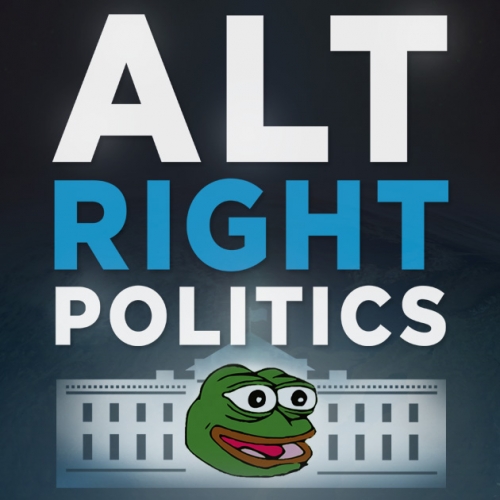
The Alt Right Among Other Rights
By Keith Preston
Ex: http://www.hlmenckenclub.org
Speaking about the intricacies of different ideological tendencies can often be a bit tedious, and certainly a topic like the Alt-Right can get very complicated because there are so many currents that feed into the Alt-Right. I know that when I spoke here last year I was speaking on the right-wing anarchist tradition, which is a highly esoteric tradition, and one that is often very obscure with many undercurrents. The Alt-Right is similar in the sense of having many sub-tendencies that are fairly obscure in their own way, although some of these have become more familiar now that the Alt-Right has grown in fame, or infamy, in the eyes of its opponents. Some of the speakers we have heard at this conference so far have helped to clarify some of the potential definitions of what the Alt-Right actually is, but given the subject of my presentation I thought I might break it down a bit further, and clarify a few major distinctions.
What is the Alt-Right?
The Alt-Right can be broadly defined as a highly varied and loose collection of ideologies, movements, and tendencies that in some way dissent from the so-called “mainstream” conservative movement, or are in actual opposition to mainstream conservatism. Of course, this leaves us with the task of actually defining mainstream conservatism as well. I would define the conservative movement’s principal characteristics as being led by the neoconservatives, oriented towards the Republican Party, and as a movement for whom media outlets like Fox News, talk radio, and publications like National Review and the Weekly Standard are its leading voices. Outside of the framework of what some here appropriately call “Conservatism, Inc.,” we could say that there is an Alt-Right that can be broadly defined, and an Alt-Right that can be more narrowly defined.
 The Alt-Right broadly defined would be anything on the Right that is in opposition to the neocon-led Republican alliance. This could include everything from many Donald Trump voters in the mainstream, to various tendencies that have been given such labels as the “alt-lite,” the new right, the radical right, the populist right, the dark enlightenment, the identitarians, the neo-reactionaries, the manosphere (or “men’s right advocates”), civic nationalists, economic nationalists, Southern nationalists, white nationalists, paleoconservatives, right-wing anarchists, right-leaning libertarians (or “paleolibertarians”), right-wing socialists, neo-monarchists, tendencies among Catholic or Eastern Orthodox traditionalists, neo-pagans, Satanists, adherents of the European New Right, Duginists, Eurasianists, National-Bolsheviks, conspiracy theorists, and, of course, actually self-identified Fascists and National Socialists. I have encountered all of these perspectives and others in Alt-Right circles.
The Alt-Right broadly defined would be anything on the Right that is in opposition to the neocon-led Republican alliance. This could include everything from many Donald Trump voters in the mainstream, to various tendencies that have been given such labels as the “alt-lite,” the new right, the radical right, the populist right, the dark enlightenment, the identitarians, the neo-reactionaries, the manosphere (or “men’s right advocates”), civic nationalists, economic nationalists, Southern nationalists, white nationalists, paleoconservatives, right-wing anarchists, right-leaning libertarians (or “paleolibertarians”), right-wing socialists, neo-monarchists, tendencies among Catholic or Eastern Orthodox traditionalists, neo-pagans, Satanists, adherents of the European New Right, Duginists, Eurasianists, National-Bolsheviks, conspiracy theorists, and, of course, actually self-identified Fascists and National Socialists. I have encountered all of these perspectives and others in Alt-Right circles.
Milo Yiannopoulos
Under this broad definition of the Alt-Right, anyone from Steve Bannon or Milo Yiannopoulos all the way over to The Daily Sturmer or the Traditionalist Workers Party could be considered Alt-Right. In fact, ideological tendencies as diverse as these have actually embraced the Alt-Right label to describe themselves. For example, Steve Bannon said at one point during the Trump campaign in 2016 that he wanted to make Breitbart into the voice of the Alt-Right, but then I have also encountered people who are actual neo-Nazis using the Alt-Right label to describe themselves as well.
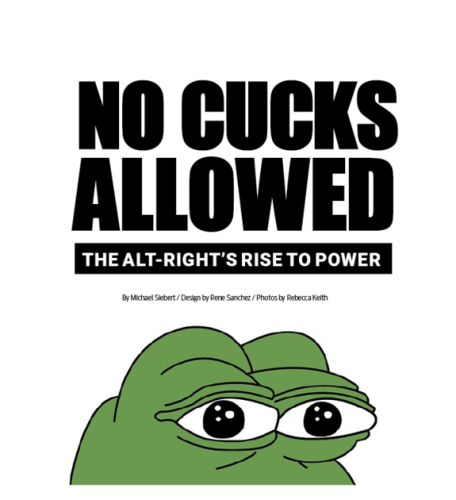
A narrower definition of the Alt-Right might be to characterize what is most distinctive about the Alt-Right. In this sense, the Alt-Right could be characterized as a collection of tendencies that is specifically oriented towards some of kind identification with European history and tradition, and regard Europe and, by extension, North America as part of a distinct Western civilization that was developed by European and, predominantly, Christian peoples. Consequently, the Alt-Right tends to be much more oriented towards criticizing ideas or policies like multiculturalism, mass immigration, and what is commonly called “political correctness,” than what is found among mainstream conservatism. This is in contrast to the Left’s views, which are increasingly the views of mainstream liberalism as well, and which regards the legacy of Western history and culture as nothing but an infinite string of oppressions such racism, sexism, homophobia, classism, anti-Semitism, Islamophobia, xenophobia, patriarchy, hierarchy, nativism, cisgenderism, speciesism, and the usual laundry list of isms, archies, and phobias that the Left sees as permeating every aspect of Western civilization. Presumably, other civilizations have never featured any of these characteristics.
In this way, the Alt-Right is obviously in contrast to mainstream conservatism given that the so-called “conservative movement” is normally oriented towards what amounts to three basic ideas. One idea is that of the foreign policy “hawks,” or advocates of military interventionism for the ostensible purpose of spreading the Western model of liberal democracy throughout the world, whose greatest fear is isolationism in foreign policy, and which is a perspective that I would argue is also very convenient for the armaments manufacturers and the Pentagon budget. A second idea is a fixation on economic policy, such as a persistent advocacy of “tax cuts and deregulation,” which in reality amounts to merely advancing the business interests of the corporate class. And the third idea is a type of social conservatism that is primarily religion-driven, and has opposition to abortion or gay marriage as central issues of concern, but typically gives no thought to cultural or civilizational issues in any broader or historical sense. For example, it is now common in much of the evangelical Protestant milieu, as well as the Catholic milieu, to welcome mass immigration, as a source of potential converts, or as replacement members for churches that are losing their congregations due to the ongoing secularization of the wider society. In fact, the practice of adopting Third World children has become increasingly common within the evangelical Protestant subculture in the same way it has among celebrities and entertainers like Madonna or Angelina Jolie.
Predictably, there has been a great deal of conflict that has emerged between the Alt-Right and the mainstream conservative movement, with many movement conservatives and their fellow travelers going out of their way to attack or denounce the Alt-Right. In this sense, the attacks on the Alt-Right that have originated from mainstream conservatism essentially mirror those of the Left, or of the liberal class. For example, the Associated Press issued a description of the Alt-Right that was intended for writers’ guideline policy purposes, and which reads as follows:
The 'alt-right' or 'alternative right' is a name currently embraced by some white supremacists and white nationalists to refer to themselves and their ideology, which emphasizes preserving and protecting the white race in the United States in addition to, or over, other traditional conservative positions such as limited government, low taxes and strict law-and-order. The movement has been described as a mix of racism, white nationalism and populism ... criticizes "multiculturalism" and more rights for non-whites, women, Jews, Muslims, gays, immigrants and other minorities. Its members reject the American democratic ideal that all should have equality under the law regardless of creed, gender, ethnic origin or race (John Daniszewski, Associated Press, November 26, 2016)
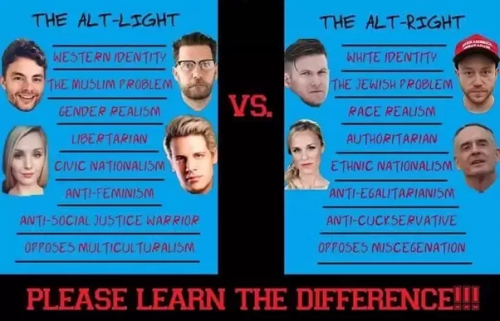
While the above quotation is from the Associated Press, I do not know that there is anything in it that could not have come from the pages of not only The New Yorker, The Atlantic, or the Southern Poverty Law Center’s Intelligence Report, but also from the pages of the National Review, Weekly Standard, the Federalist, or a Prager University video.
As for some specific examples, writing in The Federalist, conservative political scientist Nathanael Blake stated that “Christianity and Greco-Roman philosophy, rather than race, are the foundations upon which Western Civilization was built,” and suggested that the Alt-Right is actually attacking the legacy of Western Civilization rather than defending the Western cultural heritage. These questions have become a major point of contention between cultural conservatives and the racialist right-wing. Writing in National Review, David French (Bill Kristol’s one-time proposed presidential candidate), called Alt-Right adherents "wanna-be fascists" and denounced “their entry into the national political conversation.” I suppose the difference between the views of David French and the views of the Left would be that the Left would say that the Alt-Right are actual fascists, and not merely “wanna-be” fascists. Presumably, this is what separates the mainstream Right from the Left nowadays.
Writing for The Weekly Standard, Benjamin Welton has characterized the Alt-Right as a "highly heterogeneous force" that "turns the left's moralism on its head and makes it a badge of honor to be called 'racist,' 'homophobic,' and 'sexist'". Based on my own experiences with the Alt-Right, I would say this assessment by Welton is largely true. In the National Review issue of April, 2016, Ian Tuttle wrote:
The Alt-Right has evangelized over the last several months primarily via a racist and anti-Semitic online presence. But for Allum Bokhari and Milo Yiannopoulos, the Alt-Right consists of fun-loving provocateurs, valiant defenders of Western civilization, daring intellectuals—and a handful of neo-Nazis keen on a Final Solution 2.0, but there are only a few of them, and nobody likes them anyways.
Jeffrey Tucker, a libertarian writer affiliated with the Foundation for Economic Education, describes the Alt-Right as follows:
The Alt-Right "inherits a long and dreary tradition of thought from Friedrich Hegel to Thomas Carlyle to Oswald Spengler to Madison Grant to Othmar Spann to Giovanni Gentile to Trump's speeches." Tucker further asserts that Alt-Right adherents "look back to what they imagine to be a golden age when elites ruled and peons obeyed" and consider that "identity is everything and the loss of identity is the greatest crime against self anyone can imagine."
Whatever one thinks of the Trump presidency, it is highly doubtful that Trump actually draws inspiration from Hegel.
Writing in The Federalist, a libertarian feminist named Cathy Young criticized a Radix Journal article on abortion that criticized the pro-life position as "'dysgenic,” because it supposedly “encourages breeding by 'the least intelligent and responsible' women." So apparently, it is not enough to simply favor abortion rights. Instead, one has to be “pro-choice” for what are apparently the “right reasons,” such as a “woman’s right to choose,” as opposed to “bad reasons,” such as eugenic practice. This line of thought is in keeping with the fairly standard leftist viewpoint which insists that motives and intentions rather than ideas and consequences are what matters, and the standard by which people ought to be morally judged.
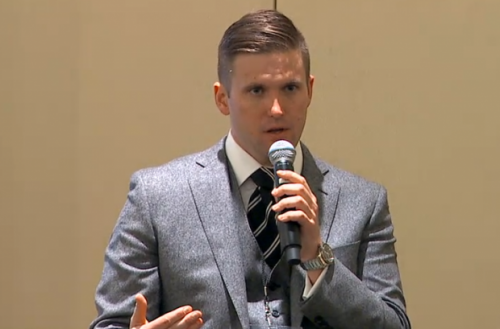
Richard Spencer
Another interesting aspect of these criticisms is that the mainstream conservatives have attacked the Alt-Right by using leftist terminology, such as labeling the Alt-Right as racist, sexist, fascist, xenophobic, etc. But a parallel tactic that has been used by mainstream conservatism has been to denounce the Alt-Right as leftist. For example, at this year’s gathering of CPAC, or the Conservative Political Action committee, Dan Schneider, who is currently the executive director of the American Conservative Union, an organization that hosts the annual CPAC conference, criticized the Alt-Right as “a sinister organization that is trying to worm its way into our ranks,” insisting that, quote, “We must not be duped. We must not be deceived,” and said of the Alt-Right:
“They are nothing but garden-variety left-wing fascists..They are anti-Semites; they are racists; they are sexists. They hate the Constitution. They hate free markets. They hate pluralism. They despise everything we believe in.”
This sounds very similar to the rhetoric that often comes from the far left where dire warnings are issued concerning the supposed threat of fascist entryism into leftist organizations. For example, there is term called the “the fascist creep” that is used by some very far Left antifa and Maoist tendencies to describe what are supposedly ongoing nefarious plots by “fascists” to infiltrate and co-opt leftist movements, and steer these towards fascism. Ironically, this conspiracy theory is very similar to traditional anti-Semitic conspiracy theories about how Jews supposedly infiltrate and take over everything, and manipulate institutions in order to advance all sorts of supposed nefarious plots. It would appear that the far Left, and apparently increasingly mainstream conservatism, has developed its own rhetoric about the “fascist conspiracy” as a counterpart to far Right fantasies about the “Jewish conspiracy.” Perhaps we could characterize the former as the “Protocols of the Learned Elders of Thule.”
Jeff Goldstein, writing in The Federalist on September 6, 2016, suggests that, quote, “the Alt-Right is the mirror image of the New Left,” and describes the Alt-Right “an identity movement on par with Black Lives Matter, La Raza, the Council on American-Islamic Relations, and other products of cultural Marxism.” Goldstein further says of the Alt-Right:
The Alt-Right is a European-style right-wing movement that is at odds with the classical liberalism upon which our country was built, and which the Left has redefined as “Right.” That is to say, the European “Right” is mapped onto a political spectrum different than our own. Our “right” — conservatism or classical liberalism —is dead-center on our spectrum, no matter how persistently the Left tries to claim otherwise. It is constitutionalism, which incorporates federalism, republicanism, legal equity, and a separation of powers.
 These comments are fairly representative of the rhetoric used by mainstream conservatives who attempt to either portray the Alt-Right as leftists, or label the Alt-Right as fascists and then claim fascism is really on the Left. The general argument that is made by mainstream conservatives in response to the Alt-Right is that “true” conservatism or the “true” Right is actually veneration for the Enlightenment-influenced ideas found in the Declaration of Independence, veneration of the Founding Fathers, and reverence for the Constitution as a kind of secular Bible. Parallel to these claims is the idea of America as a “propositional nation” that has no roots in any kind of history, culture, or tradition other than just a very vaguely defined “Judeo-Christianity.” This idea of what “conservatism” supposedly is basically amounts to being for so-called “limited government,” so-called “free enterprise,” “individualism,” and various other vaguely defined abstractions, plus policy preferences like a so-called “strong national defense” (which is often just a euphemism for the neoconservatives’ foreign policy agenda), and various center-right policy prescriptions like tax cuts, opposing Obamacare, opposing affirmative action, opposing gun control, opposing abortion, opposing gay marriage, supporting school vouchers, and other ideas we are all familiar with.
These comments are fairly representative of the rhetoric used by mainstream conservatives who attempt to either portray the Alt-Right as leftists, or label the Alt-Right as fascists and then claim fascism is really on the Left. The general argument that is made by mainstream conservatives in response to the Alt-Right is that “true” conservatism or the “true” Right is actually veneration for the Enlightenment-influenced ideas found in the Declaration of Independence, veneration of the Founding Fathers, and reverence for the Constitution as a kind of secular Bible. Parallel to these claims is the idea of America as a “propositional nation” that has no roots in any kind of history, culture, or tradition other than just a very vaguely defined “Judeo-Christianity.” This idea of what “conservatism” supposedly is basically amounts to being for so-called “limited government,” so-called “free enterprise,” “individualism,” and various other vaguely defined abstractions, plus policy preferences like a so-called “strong national defense” (which is often just a euphemism for the neoconservatives’ foreign policy agenda), and various center-right policy prescriptions like tax cuts, opposing Obamacare, opposing affirmative action, opposing gun control, opposing abortion, opposing gay marriage, supporting school vouchers, and other ideas we are all familiar with.
Nina Kouprianova
These policy preferences will often be accompanied by silly platitudes like “Democrats are the real racists,” or dubious and often flagrantly false claims like “Martin Luther King was a conservative,” or that foreign policy hawks are the real friends of feminists and gays because of their opposition to so-called “Islamo-fascism.” At times, Democrats will be labeled as fascists and anti-Semites because of their supposed pro-Islamic views, or because some on the far Left are pro-Palestinian. Taken to extremes, there are characters like Dinesh D’Souza who would probably claim that the Democrats crucified Jesus.
The representatives of “Conservatism, Inc.” will also give lip service to opposition to attacks on free speech and academic freedom in the name of political correctness, but they are very selective about this. For example, their defense of the politically incorrect does not extend to anti-Zionists like Norman Finkelstein. On the immigration issue, while there are some mainstream conservatives that are immigration restrictionists, it is just as common that the proposed method of reducing illegal immigration advanced by mainstream conservatives is to make legal immigration easier, on the assumption that the only problem with illegal immigration is its illegality. A defining characteristic of mainstream conservatism when contrasted with the Alt-Right is the total lack of seriousness, or any kind of solid philosophical or intellectual foundation that is displayed by mainstream conservatism.
The Alt-Right is more of a meta-political movement than a political one, and the specific policy proposals that are found among Alt-Rightists vary enormously. I do not know that it would even be possible to draft a platform for an Alt-Right political party because the Alt-Right contains so much diversity of ideas. However, the Alt-Right is far more serious about ideas than mainstream conservatism in the sense of having an understanding of the reality of demographic conflict, recognizing the difficulties that are associated with rapid demographic change, understanding the reality of class conflict as well as cultural and civilizational conflicts, understanding that Western liberal democracy is particular to the cultural foundations and historical circumstances of the West, and not something that can be easily transplanted elsewhere, and concerns that mainstream conservatives normally have no perception of, or do not take seriously.
I will end my presentation by pointing to an observation by Professor George Hawley of the University of Alabama, who suggested that the Alt-Right may pose a greater threat to progressivism than the mainstream conservative movement. I would agree that this is true, but only in the sense that the mainstream conservative movement poses no threat to progressivism at all. I would argue that far from being a threat to the Democratic Party, mainstream media, the corporate class and the cultural elite, the mainstream conservative movement is actually partners in crime with the progressives. The Alt-Right at least proposes ideas that are an ideological threat to progressivism even if this small size prevents the Alt-Right from being a political threat, at least at the present time.
14:25 Publié dans Actualité, Définitions, Théorie politique | Lien permanent | Commentaires (0) | Tags : états-unis, alt right, droites américaines, conservatisme américain, actualité, théorie politique, politologie, sciences politiques, définition |  |
|  del.icio.us |
del.icio.us |  |
|  Digg |
Digg | ![]() Facebook
Facebook
Les trois liens de l’étudiant à la nation selon Heidegger

Les trois liens de l’étudiant à la nation selon Heidegger
Il ne s’agit point de médire de notre enseignement, mais d’en déplorer l’écroulement national, si l’on prend au sérieux les résultats statistiques de sa partie primaire, hier classée au plus bas en Europe, pour ce qui est de l’arithmétique, et à une place médiocre, sinon alarmante pour un pays se voulant une grande puissance dans le monde, en grammaire. L’effort du présent ministre est à noter, après les folies ou divagations de ses prédécesseurs, d’introduire la discipline d’une dictée quotidienne, mais cela ressemble, à user d’une métaphore militaire, à une distribution de cartouches sans fusil, car tout l’édifice logique de la grammaire, qui est un art de bien penser, est depuis longtemps écroulé.
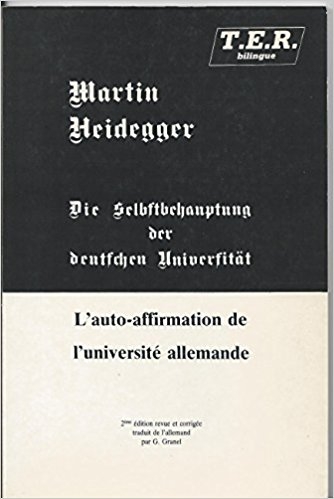 L’on parlera de réussites individuelles, ou de succès statistiques « d’apprenants » dans les examens généraux de fin d’études – mot absurde puisqu’il n ‘y aura pas eu de vrai commencement et de fondation assurée -, et de carrières, mais que vaut un savoir au sein d’une nation ou d’une nature de peuple fragilisée, et ignorant qu’elle porte en elle un destin, lequel la broiera si elle ne le maîtrise ? Cette question s’est posée au professeur Heidegger, le terme de professeur étant plus proche de la profession de foi que de l’exercice mécanique de répétitions vides, brillantes mais infécondes, comme une coque de noix vide.
L’on parlera de réussites individuelles, ou de succès statistiques « d’apprenants » dans les examens généraux de fin d’études – mot absurde puisqu’il n ‘y aura pas eu de vrai commencement et de fondation assurée -, et de carrières, mais que vaut un savoir au sein d’une nation ou d’une nature de peuple fragilisée, et ignorant qu’elle porte en elle un destin, lequel la broiera si elle ne le maîtrise ? Cette question s’est posée au professeur Heidegger, le terme de professeur étant plus proche de la profession de foi que de l’exercice mécanique de répétitions vides, brillantes mais infécondes, comme une coque de noix vide.
Lui-même n’eût point été surpris du délabrement de ce corps étudiant, car son engagement politique et celui de sa nation meurtrie et recouvrant cette santé de l’âme qu’est la vérité (selon le mot de Descartes) fut de surmonter le nihilisme ou réduction au néant de la culture entendue comme volonté populaire de garder le savoir et de se former par lui.
Dans un précédent article nous traduisions l’Appel de ce même Heidegger à ses collègues d’approuver l’appel du Guide du peuple allemand à quitter l’O.N.U. de son temps, la S.D.N. ou Ligue, Société des Nations de Genève, pour suivre son propre devoir. Nous reprenons ici le texte déjà traduit en 1987 par un défunt ancien maître de philosophie à l’université de Toulouse, Gérard Granel (1930-2000), que nous retraduisons de nouveau, pour être plus fidèle au texte allemand, du discours dit de Rectorat, adressé par Heidegger à ses étudiants de Fribourg-en-Brisgau, tenu le 27 mai 1933, lors de la solennité de sa prise en charge :
« La prise en charge du Rectorat est l’obligation de la conduite spirituelle de cette école supérieure. La suite [le mot Gefolgschaft étant employé au sens ancien chevaleresque d’une suite accompagnant un guide] des maîtres et des élèves croît et se renforce seulement à partir de l’enracinement véritable et commun dans l’essence de l’université allemande. Mais cette essence n’accède d’abord à la clarté, au rang et à la puissance, que si préalablement et en tout temps les guides sont eux-mêmes guidés par l’inflexibilité de cette charge spirituelle qui fait entrer de force le destin du peuple allemand dans l’empreinte de son histoire. »
Heidegger indique le sens d’être un Guide et en même temps un Guidé ! Alors s’évanouissent toutes les caricatures ou fantômes de fascisme que nous servent les fast-food de l’esprit.
« Car le décisif dans (l’acte) de conduire [« im Führen »] n’est pas le pur et simple aller de l’avant, mais est la force de pouvoir aller seul, non pas par égoïsme et plaisir de dominer, mais en vertu d’une détermination très profonde et d’une obligation très étendue. Une telle force oblige à l’essentiel, crée la sélection des meilleurs et éveille l’authentique suite de ceux qui sont d’un nouveau courage. Mais nous n’avons pas besoin d’abord d’éveiller. La corporation allemande est en marche [die deutsche Studentenchaft ist auf dem Marsch].
Et ceux qu’elle cherche, ce sont ces guides par lesquels elle veut élever sa propre détermination à une vérité fondée, savante et la placer dans la clarté de la parole qui agit significativement et de l’œuvre.
A partir de la décision de la corporation étudiante allemande de tenir ferme au destin allemand dans son extrême détresse advient une volonté d’essence de l’Université. Cette volonté est une vraie volonté, pour autant que la corporation étudiante grâce au nouveau droit estudiantin se place lui-même sous la loi de son essence et par là délimite avant tout cette essence. Se donner à soi-même la loi, est la plus haute liberté. »
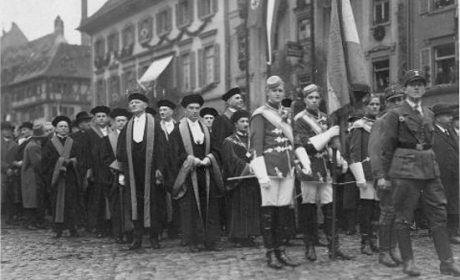
La fausse liberté académique
Heidegger de poursuivre en dénonçant les slogans dont on abreuve aujourd’hui la masse qui est invitée à tout sauf à connaître cette essence populaire ou nationale, au point que le mot traditionnel de peuple (Volk) est en langage officiel de moins en moins usé en Allemagne, remplacé par du « social », pays où – sachons le – le père de Madame Merkel, pasteur passé à l’Est après guerre pour mette son séminaire sous la coupe du ministre de l’Instruction Publique, de famille israélite berlinoise immigrée, au début du XXe siècle, de Suisse, nommé Gyzi, père de l’actuel chef berlinois de « La Gauche » (Die Linke), refusa d’admettre la réunification du pays de novembre 1989 :
« La tant vantée « liberté académique » sera repoussée de l’université allemande; car cette liberté était inauthentique [unech]), parce que seulement négatrice. Elle signifiait surtout insouciance, arbitraire des vues et des inclinations, licence [Ungebundenheit] dans le faire et laisser-faire. Le concept de liberté de la corporation étudiante allemande est maintenant ramené à sa vérité. A partir d’elle se déploient à l’avenir lien et service de la corporation étudiante.
Ce qui s’impose à l’étudiant : le lien de la nation au savoir.
1.Le premier lien est dans la communauté du peuple [Volksgemeinschaft].Il fait un devoir d’avoir part , en aidant à porter et en co-agissant, aux efforts et à la capacité de tous les états [terme préféré à celui plus égoïste et autodestructeur, au plan national, de classe] et membres du peuple. Ce lien est dorénavant affermi et enraciné dans l’existence estudiantine par le service du travail.
2. Le deuxième lien est attenant à l’honneur et au sort de la nation au milieu des autres peuples. Elle réclame la disponibilité, assurée dans le savoir et le pouvoir et sanctionnée par la discipline, à l’engagement jusqu’au bout. Ce lien embrasse et parcourt dans l’avenir toue l’existence étudiante comme un service de défense [Wehrdienst].
Le distingué Granel traduit par « service militaire », la Wehrmacht étant littéralement une force de défense, tout comme la vérité, selon la même origine indo-germanique, est une défense de la réalité contre les forces destructrices.
Le dernier point, ou lien, – [le mot allemand de Bindung ne signifie pas proprement une obligation, mais un attachement, un lien, comme un membre est lié au corps, à l’organisme)] – est le plus important et touche au vif notre société qui n’est plus digne de cette qualification.

3. Le troisième lien de la corporation étudiante est liée à la charge spirituelle du peuple allemand. Ce peuple œuvre à son destin, tandis qu’il insère son histoire dans la manifestation de la surpuissance de toutes les puissances de l’existence humaine façonnant le monde, et entreprend de combattre toujours à nouveau pour son monde spirituel. Ainsi exposé au questionnement extrême de l’existence propre, ce peuple veut être un peuple spirituel. Il exige de lui-même et pour lui-même dans ses guides et protecteurs, la clarté la plus dure du savoir le plus élevé, le plus étendu et le plus riche. Une jeunesse étudiante qui se risque tôt dans la virilité et déploie sa volonté sur le sol futur de la nation, se contraint à partir du fond [von Grund aus] à ce savoir. Pour elle le service du savoir [Wissensdienst] ne devra plus être le dressage accablant et rapide à une vocation « distinguée ». Parce que l’homme d’Etat et le maître, le médecin et le juge, le pasteur et l’architecte guident [führen] l’existence populaire-étatique et dans ses traits fondamentaux éveillent aux forces de l’être humain façonnant le monde et se tiennent acérées, pour cette raison ces métiers et l’éducation attachée à eux sont confiés au service du savoir.
Le savoir n’est pas au service des vocations, mais à l’inverse: les vocations [ou métiers] suscitent et régissent ce suprême et essentiel savoir du peuple pour sa propre existence. Mais ce savoir n’est pas pour nous la prise de connaissance tranquille d’entités et de valeurs en soi, mais au contraire la plus aiguisée dangerosité de l’existence au milieu de la surpuissance des étants. Le questionnement de l’être en général arrache au peuple travail et combat et le contraint à son Etat auquel appartiennent les vocations.
Les trois liens – par le peuple au sort de l’Etat dans la charge spirituelle – sont pour l’essence allemande également originels [gleichursprünglich]. Les trois des services qui en jaillissent – service du travail service de défense et service du savoir – sont également nécessaires et de rang égal.
Le but de l’enseignement: faire germer ce que le temps seul mûrira
Après la guerre, Heidegger poursuit cet effort ou patience de pensée, en citant le poète Heinrich von Kleist qui assurait que le sens de l’effort de penser, travailler, combattre, ou l’effort en un mot qui les lie tous, de poétiser ou, pour le dire mieux, de renforcer et serrer de plus près le travail de l’activité scientifique dans lequel s’épanouit le philosophie, devait déboucher un siècle plus tard sur la germination d’une créativité qui continuerait de faire renaître l’existence, celle des peuples et du savoir dont ils sont l’enveloppe. Ce message est dans la vidéo aux sous-titres anglais ci-dessus.
Cela exige sérieux, continuité de l’effort, persévérance, un questionnement constant de notre origine, ce qui va plus loin et plus haut que l’imitation de modèles, et qu’il entend par la métaphysique. Inutile de dire que notre présent monde a ce dernier terme en horreur. Aussi l’avenir se dérobera-t-il à lui.
Pierre Dortiguier
VIDEO: https://archive.org/details/MartinHeideggerVolkPhilosopher
01:59 Publié dans Ecole/Education, Philosophie | Lien permanent | Commentaires (0) | Tags : martin heidegger, philosophie, philosophie politique, allemagne, enseignement, université, années 30 |  |
|  del.icio.us |
del.icio.us |  |
|  Digg |
Digg | ![]() Facebook
Facebook


